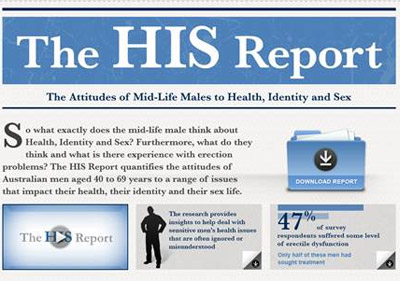Mid-life Males Still Having Sex - Just Not as Much as They'd Like

Mid-life Males Still Having Sex - Just Not as Much as They'd Like
Perception is reality for most middle-aged men who are convinced that other men their age have sex more frequently than they do.
Many men, however, do expect their sex lives to improve and are looking forward to a time when their life is less affected by children and work commitments.
These are key findings of The HIS Report, which is based on a nationwide survey of more than 1,500 men aged 40-69 years conducted by Galaxy Research for Lilly Australia and explores the attitudes of mid-life males to Health, Identity and Sex.
The report reveals that on average, men aged 40-69 years are having sex three times a month but consider five times a month to be the norm for men of their age.
For those men with children, 42 per cent expect that they will have more time for sex when their children leave home and 39 per cent believe their sex life will improve. Equally, 37 per cent of men anticipate having more time for sex when they retire and 28 per cent expect an improvement in their sex life at that time.
'Today, many dads in their 50s and 60s still have kids living at home and they are taking longer than ever before to move out," said Melbourne-based social researcher Jeff Gilling.
"Added to this, today's 50 to 60 year old is not 'gearing down' or preparing to shuffle off on a Zimmer frame into a nursing home. Instead, they are gearing up for their next life stage.
'As the Baby Boomer generation has reinvented every life stage through which they have passed, so too are they reinventing retirement. With increased lifespans, many can expect to live well into their 80s and 90s and expect an active sex life to be part of that," Mr Gilling said.
Having a healthy sex life is considered important to 80 per cent of men aged between 40 and 69 years, including more than a third (37 per cent) who consider it to be very important.
'A healthy sex life is a significant measure of masculinity and overall health. As such, it's still as important for many in their 50s and 60s as it was when they were in their 20s and 30s," Mr Gilling said.
'However, while this research shows that a considerable number of mid-life males feel their sex life isn't up to scratch, many take their ability to perform when the opportunity presents for granted," he said.
The HIS Report found that nearly half (47 per cent) of men aged 40-69 years have some level of erection difficulty and that 48 per cent of those who rate this difficulty as a major problem consider a healthy sex life to be very important. However, only 20 per cent of men unaffected by erection problems also deem a healthy sex life to be very important.
'It's the old adage – they don't know what they're missing until it's gone," Mr Gilling said.
The frequency of having, or attempting sex, declines markedly as the severity of erection problems increases, with around half of all men with moderate or severe erection difficulties revealing that they had not had sexual intercourse or any other sexual activity in the past six months. Among those that have, as many as half gained little or no enjoyment from the experience.
'As sex plays an integral role in marriage, erection problems affect every aspect and I sometimes feel rejected because of it," said one respondent to the survey who has erection difficulties. 'It does affect the way I see myself and the way I relate to others."
Not achieving an erection during occasions when it is considered a normal response is a concern to three-quarters of men who suffer erection problems and 63 per cent acknowledge that this impacts on their daily life. Among those for whom erection difficulties are a major problem, 86 per cent say that not responding physically to sexual stimulus impacts on their daily life.
According to the research, the full impact of erection problems is not just limited to sex. Intimacy also suffers with around half of all those with erection issues reporting a loss of intimacy with their partner as a result of their condition. Among those with severe erection difficulties, three-quarters report less intimacy.
'Many automatically link erection problems to sex when in fact their impact on other areas of intimacy, like kissing, cuddling and conversation, can impact equally on a man's psyche and his relationship," said Dr Michael Gillman, a Brisbane-based doctor with an interest in men's health.
The research shows that 62 per cent of men who consider their erection difficulties to be a major problem say it has changed the dynamic they have with their partner and 69 per cent say that they had a more intimate and fulfilling relationship before suffering from erection difficulties.
'Many men stop being affectionate with their partner, preferring to suffer in silence rather than explain what they're going through. This often leads to relationships breaking down completely. We know from the research that once men do talk to someone about their erection problems they wish they had done so earlier," said Dr Gillman.
Copies of The HIS Report are downloadable from www.HISreport.com.au
MORE



